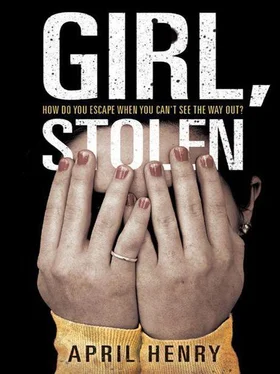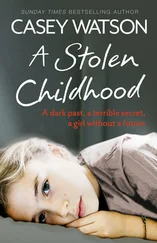In her right hand, she held a hot dog wrapped in a piece of bread. The hot dog had been boiled until the skin split. The bread hadn’t even been toasted. It didn’t matter much because she wasn’t hungry. And it was easier to eat than something that required a knife and fork. No scraping her utensils across her plate, trying to figure out where the food was. She never liked eating with anyone besides Dad and Danielle. What if she splashed sauce on her top or she was grinning away with something green wrapped around a tooth?
“When you eat, how do you know where the food is?” Griffin asked.
“My dad likes to tell me like he’s a fighter pilot. You know” — she deepened her voice — “the peas are at eleven o’clock, the meat loaf is at two, and you’ve got mashed potatoes coming in at seven o’clock.”
Griffin laughed. For a second, Cheyenne forgot she wasn’t talking to a friend, like Sadie or Kenzie. But only for a second.
She spoke around another bite of hot dog. “He used to cut up my food for me, because he was afraid I would choke. It was really embarrassing, especially if we were in public.” Secretly, Cheyenne always hoped people still took her for a sighted person. In restaurants or movie theaters, she would try to tuck her cane out of sight. Everyone told Cheyenne that she didn’t look blind, that she looked “normal.” If she hid her cane, then people talked to her, not to whoever was with her. Everything changed if they figured out she was blind. She was tired of waiters who took everyone else’s order and then said, “And what will she be having?”
Griffin said, “Even if someone tells you where everything is, it must be hard to find it on your plate.”
“That’s why I bring my lunch to school. Then I can just unwrap and eat one thing at a time. And since I made it, I know exactly what it is.”
Another reason Cheyenne brought her own lunch was that she didn’t want anyone to have to carry her tray for her. People had to help her enough already, without her asking for more. She didn’t like to accept more than she could give back. She kept a mental tally of people who did favors for her, and she tried to keep the balance sheet even. If she helped Kenzie with an essay for English, then it was okay for Cheyenne to accept Kenzie’s offer of a ride home.
“You know what?” Griffin asked. “The whole time you’ve been talking, I’ve been trying to eat with my eyes closed. It’s harder than you would think.”
Cheyenne resisted saying something sarcastic. Sometimes people did this, closed their eyes for a few seconds and imagined it gave them insights into what it was like to be her. Only, at the end, they could still open their eyes and see.
Instead she said, “You know what I miss? Like if you have a baked potato and it has some cheese on top but it all ended up melted on one spot? When I could see, I could move the cheese around so I got some in every bite. Or if there was something I didn’t like in a casserole, like green peppers, I could pick them out. Now I usually just eat whatever ends up on my fork, even if I don’t like it very much.”
Every word Cheyenne was saying was true, but it was also a mask, a lie to lull Griffin into relaxing around her. She had heard Roy’s car start up and drive off. Since then, there had been quiet. No vehicle engines, no whining saws. Even the dog was no longer barking.
Cheyenne thought it was just her and Griffin. In the house, for sure. Maybe, if she was lucky, the rest of them were gone from the property, too. However many there were. She had heard four voices while she was in the car, too terrified to move — Griffin, his dad, and two other men. Of course, it was possible there were even more but they just hadn’t spoken. She hoped the vehicle that had been driven away as they were walking into the house meant the other two men had left, too.
So she was pretty sure she and Griffin were alone. But how long would it be before one of the other three men came back? This might be her only chance.
She popped the last bite of hot dog into her mouth. Trying to sound casual, she shifted the food into her cheek and mumbled, “I have to go to the bathroom.”
“All right. Just a second. I have to untie you.”
He knelt beside her. For a second, Cheyenne wondered if there was a knife on the table. Did she have the strength – emotional and physical — to bury it between his shoulder blades? Could she kill a person if her own life was on the line? And was her life on the line? Maybe these men would ask for ransom and then let her go. But wasn’t it just as likely that they would take the money and never give her back?
Griffin finished untying her ankle, then helped her to her feet and led her down the hall. He opened a door. “The sink’s to your right, the tub’s on your left, and the toilet is all the way back on your right.”
“I’m going to turn the water on in the sink a little bit,” Cheyenne said. “Just for some privacy.” She emphasized the word privacy . Hoping to embarrass him a little. Hoping to push him farther away from the door.
As Griffin closed the door behind Cheyenne, she put her hand on her side of the knob. Her fingers pushed in the lock button just as it closed. If Griffin heard it, he would think she just wanted to be sure she was alone, and she did. But not for what he was thinking. Even the lock wouldn’t buy her much time. No more than a minute or two. But maybe a minute would be enough.
Then Cheyenne walked straight back, hands outstretched, kicking her feet a little ahead of her so she wouldn’t stumble over a dirty towel or the sink pedestal. On her left, her fingers brushed a plastic shower curtain. When she found the sink, she paused for a second to turn on the water. Not full blast, but enough to hide small noises.
Griffin hadn’t said anything about a window, but even before she reached it she could feel the air change. When she touched it, the pane was cold. She could tell it was made of those honeycomb panels that blurred but did not entirely hide what was behind them. Was someone on the other side right now seeing her hand, broken into pieces like a kaleidoscope? She turned her head, her left eye straining, but all she could see was the blurry starfish of her fingers.
What was on the other side of this window? She traced its outlines, stopping when she found a divide in the middle at about eye level. And, her fingers told her, a lock shaped like a half moon. Something inside her loosened a tiny bit when she tried the lock and it swiveled. She had hoped for this and feared it in equal measures.
In her head, Cheyenne reconstructed the twists and turns they had taken since leaving the car. It was a skill she had learned in the last three years. Before she had lost her sight, she could barely be counted on to remember left or right. After the accident, one of the first things the orientation and mobility instructor had taught Cheyenne was to always, always, always orient herself using cardinal directions.
Now it was second nature, like a computer program running in the background, there when she needed to know whether she was facing east, west, south, or north. She had gotten out of the car and felt the sun at her back. So that had been east, because at that point the sun was still rising. They had walked more or less due west to the house. A bedroom was at the back of the house — so even farther west — and next to it was the bathroom in which she now stood.
On the other side of this window, there was — what? Not the men, not the power tools, not the driveway. That was all on the other side of the house. Probably no neighbors, or Griffin wouldn’t have let her walk around outside with her hands tied behind her. The air ahead of them had been silent and still. No sounds, no smells except the scent of pine needles.
Читать дальше












